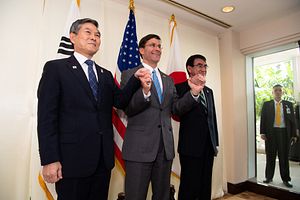U.S. Secretary of Defense Mark Esper’s second trip to Asia comes at a particularly turbulent time, even by the standards of the Trump era. Alliance burden-sharing doldrums, an increasingly recalcitrant North Korea, and the pending expiration of a South Korea-Japan intelligence-sharing agreement loom large over his regional tour.
The cost-sharing issue in particular has frothed up to ridiculous proportions, comprising what effectively amounts to U.S. strategic malpractice. The Trump administration is making egregious and extortionary demands of South Korea and Japan – each a significant force multiplier for American influence in the Asia-Pacific region.
Ahead of Esper’s trip, the U.S. Department of Defence published an article emphasising the role of its regional partners.
“America’s network of alliances is its greatest combat advantage, and nowhere is that more important than in the Indo-Pacific region, which Defence Secretary Dr Mark T. Esper has called America’s ’priority theatre’,” the article began.
But looking at the defence secretary’s actions, it’s not clear that the United States fully recognises exactly what it is squandering with President Donald Trump’s myopic and transactional focus on extracting higher payments from treaty allies in particular.
In Seoul, Esper had no choice but to debase himself and speak for his president. Noting that South Korea was a “wealthy country”, he made the argument Seoul “could and should” pay more. That in itself is not controversial, but the current demand – that South Korea increase its contribution for host nation support more than fourfold – is not one made with Seoul’s dignity in mind.
Indeed, before Esper arrived in Seoul, articles and editorials from both traditionally conservative and liberal newspapers had been discussing the right course of action for the country. On both sides of the political spectrum, there is a growing consensus that the U.S. is treating South Korea poorly.
What Esper failed to answer for is what the United States can realistically expect Seoul to do under the current circumstances. South Korean President Moon Jae-in would face political evisceration for acquiescing to extortionate American demands.
Trump perhaps may be looking for nothing more than an excuse to withdraw U.S. troops from the Korean peninsula, something he has hinted at since his presidential campaign in 2015 and 2016. The demands of South Korea are likely being made with an expectation of a convenient “no” from Seoul – one that would provide political cover for a dramatic alteration to the alliance.
On North Korea, Esper has tried to preserve space for diplomacy, even if the prospects of a U.S.-North Korea deal appear more futile than ever in the final weeks of 2019.
“We always have to remain flexible in terms of how we support our diplomats to ensure that we do not close any doors that may allow forward progress on the diplomatic front,” Esper said, suggesting that the U.S. and South Korea could modify an upcoming air forces exercise that has elicited sharp criticism from Pyongyang.
Esper’s most urgent short-term task in the region appeared to have been his push to dissuade Seoul from putting an end to the 2016 General Security of Military Information Agreement with Japan. This allows the two U.S. allies to share classified military information directly. Seoul announced in August that it would not renew the agreement in a bid to punish Japan for what it views as undue Japanese coercion in the form of export controls imposed against South Korea.
On this count, too, Esper failed – perhaps unsurprisingly given that the U.S. appears unconcerned more generally with the health of its separate alliances with Seoul and Tokyo. (Similar extortionate host nation support demands are being of Tokyo as of Seoul.)
Jeong Kyeong-doo, Esper’s counterpart, said Seoul may reconsider its position if Tokyo reversed course on its punitive export control measures against Seoul, which South Korea sees as retaliation for a court decision last year calling on Japanese companies to pay reparations to South Koreans affected by Imperial Japan’s forced labour practices during the occupation of Korea.
The secretary’s trip will take him to Southeast Asia next – a region that has recently seen direct evidence of U.S. disinterest despite what strategic documents on the “Indo-Pacific” from the administration have claimed. Trump’s non-attendance at this year’s Asean summits has created space for China. Esper’s stops in Thailand for the Asean Defence Ministers’ Meeting Plus and his stops in the Philippines – a U.S. ally – and Vietnam – an emerging partner – provide opportunities to correct some of the damage.
But after all is said and done, the software that undergirds U.S. alliances and partnerships in Asia is deeply malfunctioning. If the U.S. is to retain its historic role and influence in the region, it should hope that what is lost today can be regained tomorrow.
A version of this article first appeared in the South China Morning Post. It is republished here with kind permission.
































